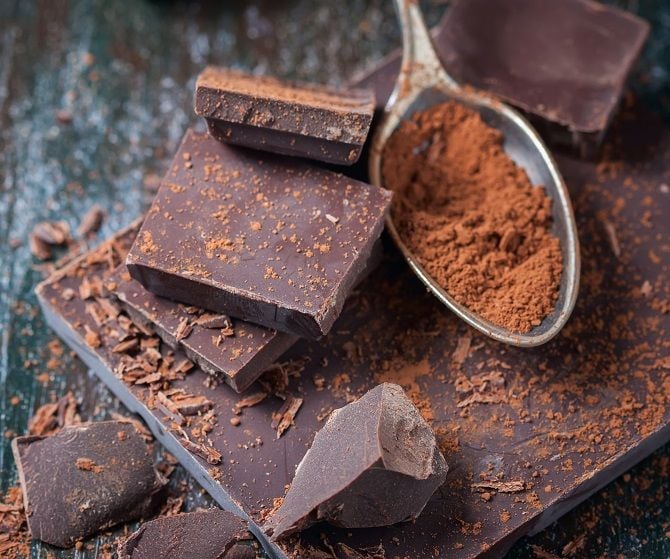By Will Hawkins
Is milk chocolate good for you?
It's something that many of us really want to be true. Sadly, milk chocolate is generally not regarded as a part of a healthy diet.
But is it all bad news for milk chocolate eaters? Our experts have taken a look at what your favourite sweet treat does to your body to see if there is any good news to cling onto.
Does milk chocolate have any health benefits?
It might surprise you to learn that are some small health benefits to be gained from milk chocolate. Let's find out what they are.
It contains antioxidants
Cocoa powder is a great antioxidant, and while milk chocolate has a lower cocoa content than dark chocolate, it still contains these antioxidants.
The magic ingredient is flavonols, a plant-based compound that's found in cocoa powder. Antioxidants protect your body from cell damage that's linked to a range of physical and mental health conditions.
There are actually many good things about cocoa, and milk chocolate gives you a watered-down version of all the health benefits that dark chocolate brings.
It provides plenty of micronutrients
Understandably, a lot of the discussion around milk chocolate focuses on fat and sugar content, but it's also packing plenty of nutrients that important for a healthy body.
Given that it's made with milk, it won't surprise you to learn that milk chocolate contains plenty of calcium. You'll also get small amounts of iron, potassium, zinc, Vitamin A and Vitamin K.
Can you get these important nutrients elsewhere? Of course you can, but assuming you don't plan on cutting chocolate out of your life any time soon, it's nice to know that it isn't completely nutritionally empty.
Why is milk chocolate bad for you?
Let's assume we all know that milk chocolate isn't a health food. Here are a few reasons why you should exercise caution and not eat too much of it.
There's a lot of added sugar
To offset the natural bitter aftertaste of cocoa, milk chocolate contains a lot of added sugar. Sugar, of course, is bad for you.
It's very calorific, so too much of it will lead to weight gain. This in turn can lead to issues such as diabetes and heart disease. It also allows plaque to form on your teeth and thrive, which will eventually cause tooth decay.
When you're choosing which chocolate to enjoy, it's worth noting that a bar of milk chocolate usually contains less sugar than a bar of white chocolate. Milk chocolate contains around 52g of sugar per 100g, while white chocolate is nearer 59g.
It's very high in calories
There are about 535 calories in 100g of milk chocolate. While this compares favourably to dark and white chocolate, it's still a hefty amount.
Consider that UK health guidelines recommend a daily calorie intake of 2,500 for men and 2,000 for women. That 100g of chocolate takes care of anything between 20-25% of your daily calories before you've eaten a proper meal. That's not a habit you want to get into.
There's not as much cocoa
It's cocoa that provides the health benefits associated with chocolate, so when there's less cocoa, the health benefits aren't the same. Cocoa powder actually has quite a bitter finish, which is why dark chocolate isn't to everyone's taste.
Milk chocolate such as Dairy Milk tends to contain around 25% cocoa solids, compared with a minimum of 35% required in dark chocolate. Many of the most popular commercial dark chocolate bars are between 70-85% cocoa. Milk chocolate can't get near this.
In 2012, one study experimented with adding ground peanut skins to the chocolate mixture in an effort to raise the antioxidant profile. Researchers found that test subjects were unable to notice the difference.
However, it's not a strategy that's been adopted by commercial chocolate manufacturers.
Nutritional value of milk chocolate
100g of milk chocolate contains:
Calories: 535
Fat: 30g
Saturated fat: 19g
Sugar: 52g
Fibre: 3.4g
How to curb your cravings
We can all agree that milk chocolate is pretty moreish. For many of us, the situation is fairly simple. If it's there, we'll eat it.
The trick, then, is to only buy small amounts. It only takes a few bites to satisfy your chocolate craving. We've all bought a larger bar with intention of saving half for later, only to scoff the lot in one go.
Remove the temptation and you can happily enjoy milk chocolate without harming your long term health.

